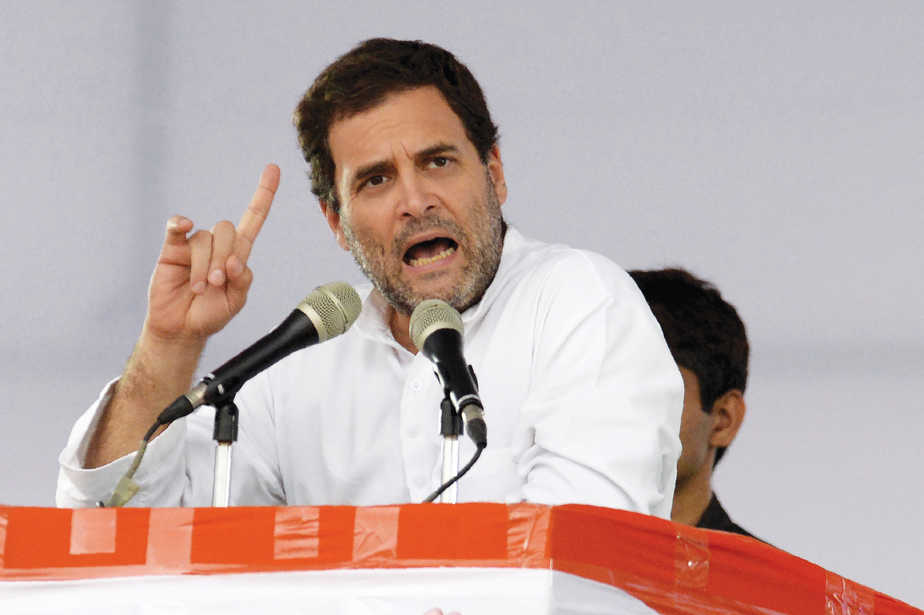Rahul Gandhi means business. He’s confronting the prime minister in his own bastion, that of political theatrics
Rahul Gandhi, 48, means business. As president of the Indian National Congress, he has been taking on Prime Minister Narendra Modi directly on a host of issues. Last month, he hit the streets, even courted arrest.
No wonder, some former NDA allies support his leadership. Andhra Pradesh Chief Minister Chandrababu Naidu’s Telugu Desam Party, also Tamil Nadu’s DMK, have come out in his support or met Gandhi in these crucial months before the polls.
Even BJP leaders privately acknowledge that Rahul Gandhi is a changed man. He is shaping up as a credible challenger to Modi, and has lately been able to send a shiver down the collective spine of the establishment. There is no issue on which he has not made himself heard — whether it’s infighting in India’s premier investigative agency, CBI, or hugging Modi on the floor of Parliament, exhibiting that he too is capable of political theatrics.
Gandhi has been attacking the Prime Minister and his policies, with a fair bit of wit. He’s proactive, aggressive and unscathing in his attack.
Commenting on the tussle between the government and Reserve Bank of India, he quipped, “Nice that Mr Patel (RBI governor) is finally defending the RBI from Mr 56”. The jibe was directed at the PM.
So what has changed? At a personal level, he’s convinced that the present government is bad news for the country and that the Congress party must come back to power to restore order, economy and the feeling of general well- being among all sections of society. A friend who is an MP says, “He’s fully committed now without an iota of reluctance. Now that he has taken the reins of the party, he is leading from the front. I feel he’s enjoying what he is doing.”
Some of the old guard were given marching orders, significantly Janardan Dwivedi and former Madhya Pradesh (MP) chief minister Digvijay Singh — the latter finds no mention in the campaign for the Assembly election of his home state. There is infusion of new blood in the party.
Of course, the former Congress chief Sonia Gandhi is kept in the loop, taking daily briefings about the state of affairs in the party. Gandhi often visits her at 10 Janpath for consultations, say insiders in the party. So there’s no break from the past. At the same time, some of those who work with Gandhi say unequivocally that he has a mind of his own, even his mother and sister know it well. But that doesn’t mean he doesn’t listen to the people around him.
The new energy that Gandhi brings to the leadership is fairly distinguished from the past in the style of functioning. “There’s more sense of urgency,” says a Congress MP from southern India who has worked closely with both mother and son.
An insider who was known Gandhi for the last 20 years, and was part of his youth brigade, calls him a “curious person” and a “very good listener — he is all ears for people who make sense.” He has an eye for detail and is a health freak, still sporting a six-pack. “Despite being 48, I won’t be surprised if he looks like a baba to some,” he quips.
Gandhi wants to know how things happen, why it happens the way it does, so many questions. He wants to understand, know the real story. For instance, if he meets a leader from the North East and he finds him or her wearing an anklet or a shawl, he would want to know the cultural or religious sanctity of those objects, or the significance of quintessential designs or patterns. And those who know him well say he has a good memory, remembers a lot of things.
Lawyer, economist and politician ST Venkatachala (Venkat), 44, who has worked closely with Gandhi, stresses, “We feel confident in his leadership. We will come back to power because he’s not power hungry.” He’s not paranoid about an ostentatious lifestyle or expensive suits. He likes to spend time with family and is a travel freak—it’s the time when he can forget that he’s privileged.
Being a scion of the Nehru-Gandhi family is a privilege but also the reason he suffered so much, losing his father and grandmother to the murderous rage of assassins. “He feels responsible to carry the legacy forward. Of a liberal, equitable India,” says a friend who’s also part of his extended coterie.
There are apprehensions in some sections of the party however, that Gandhi is not as accessible as his mother when she was the Congress President. And they blame, especially, some MPs from southern India like Sachin Rao, an MBA in corporate strategy and international business from Michigan Business School, who runs Gandhi’s office. Some describe him as a “bottleneck” and some of the leaders of the SC community even allege that Rao favours Brahmins.
However, it might just be a perception, for one of Gandhi’s closest aides is Kopulla Raju, a 1981 batch IAS officer from Andhra Pradesh before he resigned in 2013 and got lateral entry into the party. He is now chief of AICC’s Scheduled Caste department. He’s described as the ‘Ahmed Patel of Rahul Gandhi’.
Then there’s Jyotiraditya Scindia, a friend and confidante, who sits next to Gandhi in Parliament. The former is often seen peeping at the latter for approval after making a statement on the floor of the House. Other senior leaders who frequently meet Gandhi these days are Ashok Gehlot and Kamal Nath–though he is famously known not to be very friendly with Ahmed Patel.
The Congress’ media cell has been following the BJP model — carrying out extensive propaganda on the social networking sites. The most recent, of course, is over an alleged scam in the Rafale fighter aircraft deal with France. “Modi Scam Alert!” Gandhi tweeted: “$15 billion fighter jet deal re-tendered. Prime Minister’s friend’s race to tie up strategic partners. “RAFALE, (Rs) 40,000 crore loss to the exchequer was “Sayonara” (bye bye in Japanese) money to French, so Prime Minister could re-tender contract and favour friends,” he tweeted recently. Gandhi even told journalists in Indore recently that the Prime Minister will go to jail if the Rafale deal is investigated, and that there is a link between the ongoing infighting in the CBI with the Rafale investigation.
Gandhi has managed to do what BJP was known to be good at, using social media for political posturing. The government is feeling the heat. HRD minister, Prakash Javadekar, accused Gandhi of manufacturing lies every day, and crossing all limits of civility. “Rahul Gandhi failed on matter, manner and method” and that “he’s cursing the Prime Minister day in, day out” and that he “….is living in hallucination” and that “the country has not witnessed such immature politics.” Clearly, BJP is on the defensive.
The question is no more whether he’s fit to be the Prime Minister of India, but whether such a thing will indeed come to pass.





